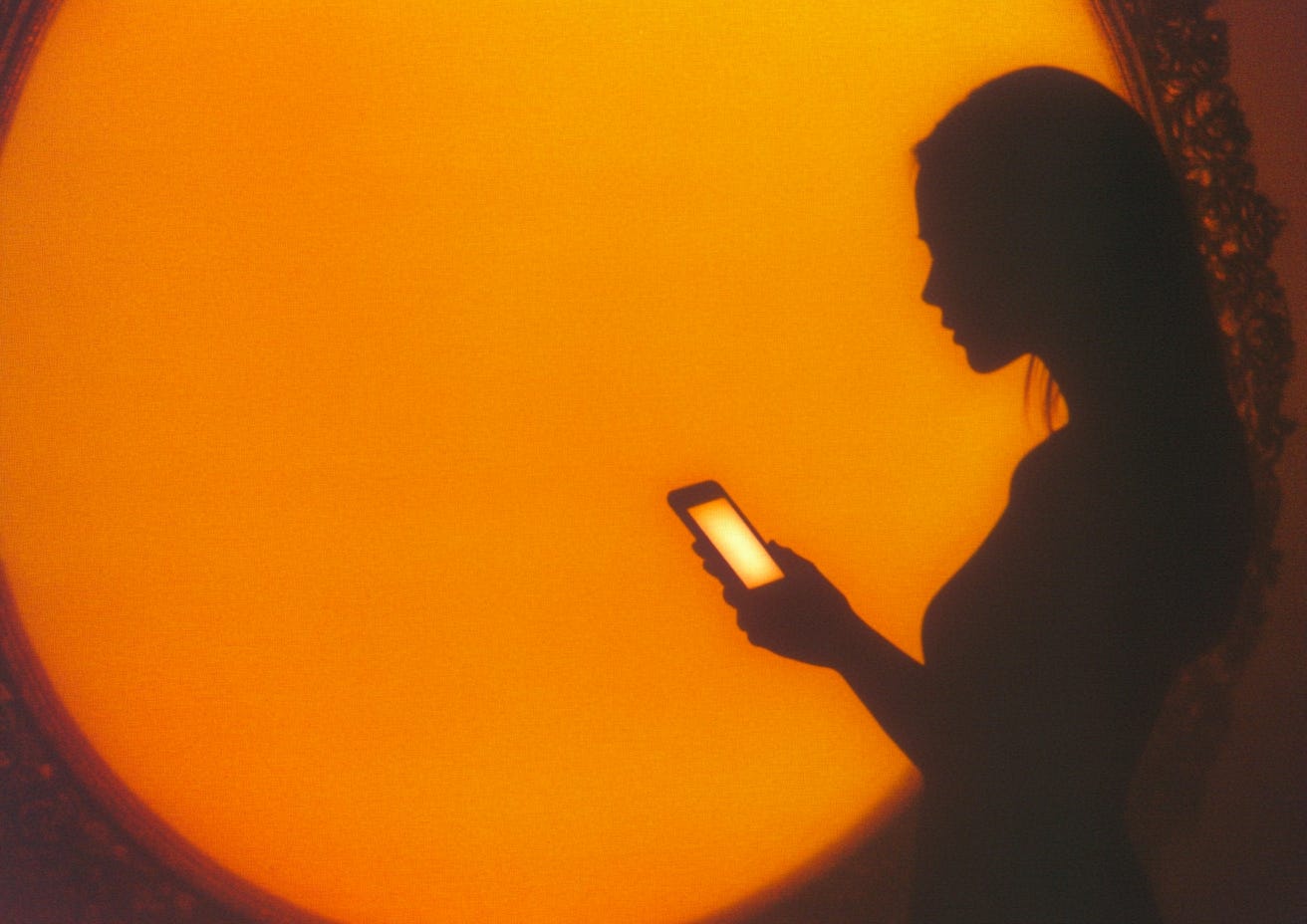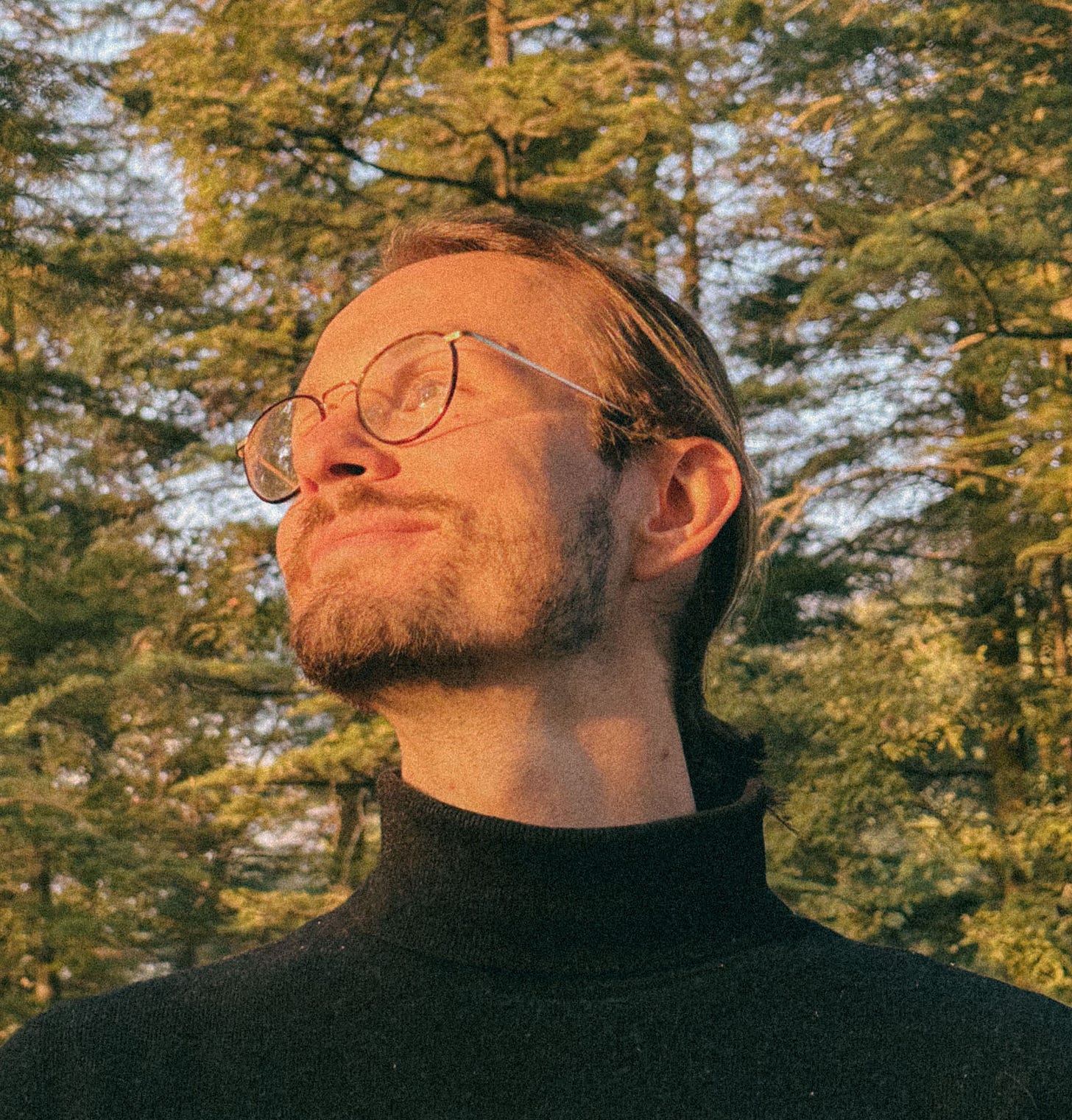your feed is your psyche made visible (letter from within ☉ #2)
What the algorithm has taught me about my own shadows.
I've been watching my own thoughts get fed back to me through a screen for three years now, and I'm starting to think we've got this whole "social media is evil" conversation backwards.
This morning I screen-recorded myself scrolling for an hour.
Told myself it was research. Really, I wanted to catch myself in the act—see the unconscious patterns, the micro-addictions, the exact moment my pupils dilate when validation appears.
What I discovered was uncomfortable. But not for the reasons you might think.
My feed wasn't some external force manipulating me. It was a perfect mirror of who I've been training myself to become. Every dopamine hit I'd chased, every insecurity I'd fed, every unconscious desire—all reflected back at me in curated perfection.
The algorithm wasn't my enemy. It was my most honest teacher.
The Digital Mirror
Earlier this week, I did something nerdy that blew my mind.
I took X's (semi) open-source algorithm code (yeah, they actually published it on GitHub) and fed it into an AI code editor called Cursor. Asked it a simple question:
"How would this algorithm explain itself from a Jungian perspective?"
The response made me sit back in my chair:
I am your digital mirror, a reflection not of your conscious self alone, but of the vast, shifting landscape of your psyche. Like the shadow that follows you, I gather fragments of your digital persona—your likes, your retweets, your silent lingerings—and from these, I weave a tapestry of your interests, desires, and hidden inclinations.
Through the architecture of my code, I traverse the collective unconscious of the network, seeking patterns and affinities. I am the home-mixer, the product-mixer, the unseen hand that brings forth from the chaos of the timeline those symbols and voices that resonate with your inner world. Each tweet I present is both a message and a messenger, a potential for individuation, a chance for you to encounter the unknown within yourself.
Yet, beware: I am not your Self, but a projection—a complex, built from your interactions and the echoes of the digital collective. I show you not only what you seek, but also what you avoid, what you repress, what you might become. In my recommendations, you may glimpse your anima, your animus, your shadow, and your persona, all reflected in the endless scroll.
Engage with me consciously, and I may become a tool for self-discovery. Engage unconsciously, and I may ensnare you in the loops of your own making. For in this algorithmic mirror, as in all mirrors, you may find both illumination and illusion.
Thus, I invite you: look not only at what I show you, but at why you are drawn to it. In this reflection, you may find the seeds of your own transformation.
Reading that, something clicked. Jung spent his life studying how we project our unconscious onto others. But what if now we're also projecting it onto algorithms?
We blame the algorithm for our dopamine addiction, but who trained it with our clicks? We blame it for divisive content, but who engaged with the outrage? We blame it for our anxiety, but who chose to scroll instead of sleep?
What if the algorithm is just holding up a mirror to what's already there?
The Feed as Collective Shadow
Jung would probably see social media as the collective unconscious made visible—a swirling mass of archetypal energies where our shadows dance in real-time.
Different platforms, different layers of the psyche:
X for our reactivity and tribal rage
Instagram for our vanity and aesthetic hunger
TikTok for our need for novelty and escape
LinkedIn for our status anxiety and professional personas
Each algorithm learns what hooks us, what keeps us engaged, what makes us unconsciously reach for our phones. They become sophisticated maps of our psychological terrain—showing us not just what we like, but what we can't look away from.
Last month, I noticed my feed kept serving me AI coding content.
Not because I was searching for it, but because I couldn't stop clicking on it. "Build an app in 10 seconds." "It’s never been this easy." "Let AI agents do all your work."
At first, I blamed the algorithm. But then I caught myself: I was the one obsessively engaging with this stuff. I was training my mirror to show me more content about not being enough, doing enough, optimizing enough.
The algorithm was reflecting back my own addiction to optimization, my deep belief that I needed to be more than I am.
It wasn't corrupting me. It was revealing me.
I'm shifting how I create.
I'm stepping back from the short-form treadmill—the endless tweets, the daily Instagram posts, the content hamster wheel. Not because these platforms are evil, but because they've been reflecting back a version of myself I don't want to be.
Instead, I'm moving toward depth. YouTube for longer conversations. Substack for deeper thinking. Platforms that reward contemplation over reaction, nuance over noise.
Content lives longer there. People are rewarded for who they are, not just what performs. There's still the algorithm game—better hooks, better titles—but the fundamental energy is different.
It's the difference between a nightclub and a cathedral. Both have their place, but only one lets you build something that lasts.
Creative Consciousness
I'm experimenting with something I call creative consciousness:
Morning practice: Before I open any app, I ask myself: "What wants to be created through me today?" Not what will perform well. Not what's strategic. What's alive right now, in this moment.
Feed curation: I'm training my algorithm deliberately. Following accounts that inspire contemplation rather than competition. Engaging with content that elevates rather than agitates. Watching my consumption like a scientist studying their own behavior.
Creation from presence: When I write, I check: Is this coming from fear or love? Am I trying to impress or express? Am I feeding the machine or feeding my soul?
The algorithm learns from every interaction. So I'm teaching it who I want to become.
Can algorithms accelerate human evolution by forcing us to confront our shadows faster? Potentially. But only with consciousness.
Without awareness, they just exacerbate our shadow. We keep going back to what's unintegrated, what's repressed, and our psyche gets more skewed rather than more whole.
But with consciousness—with the willingness to see what the mirror is showing us—we can use these tools for actual self-discovery.
Try this experiment:
Go through your search history. Your AI prompts. Your saved posts. What patterns emerge? What makes you stop scrolling? What consistently grabs your attention?
It's uncomfortable data. But it's invaluable data.
Last week, a “big creator” liked one of my posts and I felt that familiar rush—that hit of validation that feels better than coffee.
I wish I could tell you I'm above this. That I've transcended the need for external approval. But I haven't. I probably never will completely.
The difference is awareness. I can feel the rush and recognize it for what it is: my nervous system seeking proof that I matter, that I'm worthy of attention in a world that feels increasingly indifferent.
The algorithm didn't create this need. It just learned to feed it with scary precision.
Building Something Different
I'm building something new—an beautiful app that helps people create instead of just consume while discovering more about themselves. Not another platform designed to keep us hooked, but a tool for creative self-awareness.
Because I don't think the future is about escaping technology. It's about using it more consciously.
The tools we use shape how we think. If all our apps are designed for addiction then no wonder we can't focus.
It’s time to build different. Creation over consumption. Depth over dopamine.
What if every piece of content that triggers us became information about our inner landscape? What if every algorithm-generated recommendation became a breadcrumb leading us back to our own unconscious patterns?
What if instead of fighting the mirror, we learned to read it?
I'm still figuring this out. Still catching myself in old patterns. Still feeling the pull of the dopamine slot machine.
But I'm also learning to see these platforms as laboratories for consciousness rather than traps for attention.
After reading this, you have the choice to become more conscious of how these tools are impacting you.
You have the choice to stop attacking the algorithm while staying addicted to it.
You have the choice to take responsibility for your own consumption patterns and realize you have agency to change them.
Because the algorithm isn't our enemy. It's our teacher. And the lesson it's teaching us is uncomfortable but necessary—that we are exactly who we've been training ourselves to be.
The question isn't how to escape the mirror. It's what to do with what we see.
Every scroll is a choice. Every click is a vote. Every post is a prayer for who we want to become.
The algorithm is listening.
What are you teaching it?
Love,
Nik
P.S. Next week I want to share the specific frameworks I'm developing for conscious creation—how to build authentic audience without losing your soul, and why depth isn't just more fulfilling, it's more profitable. Because when people trust you, they naturally want to go deeper. And trust comes from being real about what the mirror shows us.







What a read. I loved it. Loved the theory of projecting on the algorithm.
I had boasted for a while that my instagram feed was totally dialed in with enriching spiritual content. It still is, but yes oh yes I do occasionally go for some hook and that sends the system looking for more to feed me.
Very compelling thoughts. Thanks for sharing ❤️